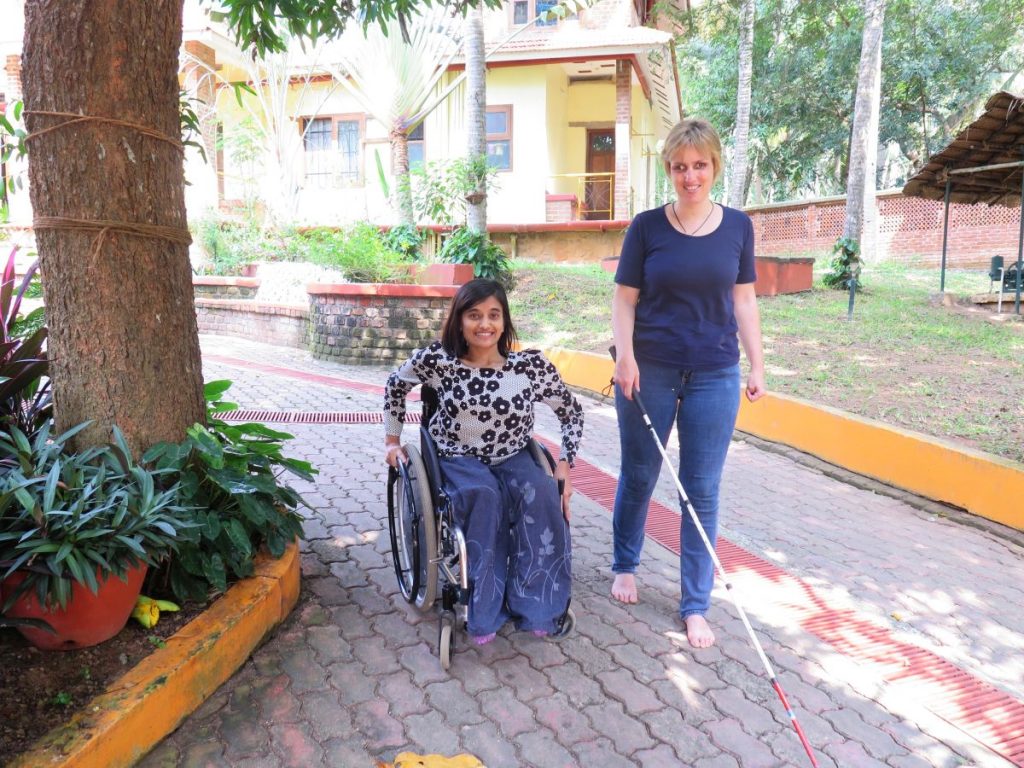The crisis from a different angle,
“Dear ladies and gentlemen! The next speaker is Amrita Gyawali from Nepal!”
Applause fills the theater… but the stage remains empty. Yet, we hear a clear voice that says: “And now?” Right in front of the first row Amrita sits in a wheelchair and smiles at the audience, then she points up to the stage and asks, “Shouldn’t I be up there?” Silence, shuffling feet, an awkward moment. But then two other kantharis lift Amrita in her wheelchair and place her on top of the one-and-a-half-meter higher platform. And now she starts her talk…
—
Amrita was three years old, when she and her family were traveling from Delhi to Kathmandu when the bus was involved in an accident. Amrita lost her father, mother and all her siblings. She was the only one who survived with a spinal cord injury.
At the age of five, she came to the SOS children’s village, Jorpati, in Kathmandu, which specialized in children with disabilities. There she found her new family. Her new home had ramps everywhere and it had accessible toilets. She was able to do everything independently and she never felt disabled.
However, she didn’t want to be limited to the house. Like every other child, she wanted to go to school, play outside and participate in various activities. Unfortunately, schools were not accessible. Barriers were everywhere. Not just physical barriers, people became barriers too. Often, they stared at her, shaking their heads in a patronizing way and talk with sorrowful voices: ‘poor you, you are wheelchair bound!’. Amrita asked herself “What do they mean by wheelchair bound? The wheelchair is not a barrier, it is my tool to find freedom! … I can go to all places if they are accessible.”
It took time to realize that the wheelchair was not her actual barrier. The real barriers were the inaccessible environment and the negative attitude of society.
But in her kanthari TALKS speech, she dreams about an accessible Kathmandu… with ramps instead of stairs and wheelchair accessible public toilets. She however pointed out one restriction:
“I have seen in the bible that I have no place in heaven. Why don’t I have a place in heaven? Nowadays you can find anything on the internet, and therefore I googled and found a picture that shows stairways to heaven… ;-)”
—
Today, after a long time, I phoned Amrita. She told me how, in the meantime she had traveled the world to get inspiration for her “embrace the change” initiative.
Together with other disabled and non-disabled people, she founded Sakshyam, an organization that aims to make jobs and education accessible to the physically disabled. She also reported months of hospitalizations that had set her back in her project work.
“And how do you cope with the Corona crisis?” I asked.
“It’s quite a disaster!” she sighs. Amrita is usually not a complainer, but now she let go… “I believe that during the Corona pandemic, the whole health system has more or less forgotten us, the chronically ill and disabled. None of us had enough time before the Lockdown was imposed to stock up on drugs, urine bags and diapers for adults. My friends wanted to deliver a bag of such products to me, but they never arrived, they were stopped by the police. There was no room for negotiation. And for some inexplicable reason the price of medicines is soaring. Are some people making huge profits at our expense?! And then “social distancing”! Don’t make me laugh! How is this supposed to work?! Even if you live alone as a wheelchair user, many of us need help all the time. And it’s about very intimate help, like putting on a catheter and personal hygiene.”
We discussed about the shocking case in January, when a single parent in Wuhan had to leave his multiple-disabled son at home because he tested positive and was put in a hospital. Despite many calls to neighbours to take care of his child, the son died alone in the apartment – out of lack of care, not from the virus.
Amrita said “We have to be prepared for possible future lockdowns. We at Sakshyam want to ensure that new policies that include exemptions for us will be in place, and I will fight for that!”
Amrita’s Dream Speech at kanthari TALKS in 2016
And a video starring Amrita about a barrier free life:

